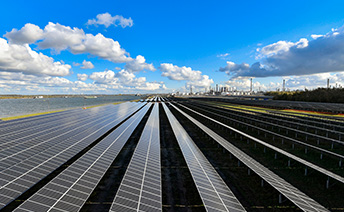FuelsEurope
FuelsEurope represents the interests of 38 companies manufacturing and distributing liquid fuels and products for mobility, energy and feedstocks for industrial value chains in the EU.[1] FuelsEurope is one of two divisions within the European Fuel Manufacturers Association (EFMA); the other division is Concawe, which carries out research in environmental, health and safety issues relevant to the oil industry.[2]
Membership of board/executive committee: Shell is a member of the EFMA board of directors.
- 2022 assessment outcome: Aligned
- 2021 assessment outcome: Aligned
Summary
Shell benefits from FuelsEurope’s advocacy on issues that impact the refining sector. This includes energy and climate regulations, transport fuels and emissions to air, water and waste. Both FuelsEurope and Concawe provide best practice on managing risks to the environment from the production and use of oil products.
We found FuelsEurope to be aligned with our climate and energy transition-related policy positions.
We will remain a member of FuelsEurope. We will continue to engage the association on climate and energy transition topics. We will continue to track alignment between FuelsEurope’s climate and energy transition-related positions and our own.
Further information
Click on the sections below to read more.
Paris Agreement and net-zero emissions
- FuelsEurope has stated support for the goals of the Paris Agreement.[3]
- FuelsEurope has stated support for the EU’s objective of climate neutrality by 2050.[4] [5]
Carbon pricing
- FuelsEurope has stated support for carbon pricing and the EU ETS.[6] [7]
- In 2022, FuelsEurope signed up to a joint industry statement on the Revision of the EU ETS, which stated support for the revised EU ETS Directive, measures to address carbon leakage and the proposed Carbon Border Adjustment Mechanism (subject to certain changes to the mechanism design).[8] [9] [10] [11]
Energy efficiency
- In its November 2021 statement on the EU Energy Efficiency Directive, FuelsEurope states support for the revision of the Energy Efficiency Directive, and for “efforts to encourage energy efficiency in the EU”.[12]
Decarbonised hydrogen
- FuelsEurope has stated support for all forms of clean hydrogen.[13]
- In a 2022 joint industry statement on a pragmatic regulatory framework necessary for the hydrogen market, FuelsEurope stated the need for “large-scale availability of renewable fuels of non-biological origin (RFNBOs), supplied cost-competitively and securely across Europe”.[14] Hydrogen produced using renewable energy is a type of RFNBO.
Natural ecosystems
No position
Carbon capture and storage
No position
Environmental, social and governance (ESG) standards and benchmarks, sustainable finance taxonomies
- FuelsEurope has stated support for sustainable finance taxonomies, stating: “The adoption of the Taxonomy Regulation is an important step towards mobilising investments for low-carbon technologies.”[15]
Coal
No position
Electrification with renewable or low-carbon power
No position
Gases and methane
No position
Road transport: Passenger cars and vans
- FuelsEurope has stated support for the decarbonisation of transport with a focus on the “decarbonisation of energy employed, rather than the power-train technology”.[16] In relation to the EU’s proposed CO2 emission standards for cars and vans which would effectively ban sales of internal combustion engine cars and vans in the EU from 2035, FuelsEurope stated: “While the growing uptake of new electric cars is a major contributor to the decarbonisation of road transport, low-carbon liquid fuels represent a complementary solution and allow to seize the immediate environmental benefit of decarbonizing the existing fleet”.[17] FuelsEurope also stated “We would like to stress that sustainable renewable fuels are meant to complement and not lessen the EU’s efforts on electrification of cars during the transition to zero-emission mobility.”[18] Shell stated support for the proposed ban. We believe that FuelsEurope and Shell are aligned on the overall objective of decarbonising light-duty transport, but have different views on the plan to achieve it.
- In a 2022 statement, FuelsEurope welcomed “the outcome of Council to complement the vehicle electrification strategy with the potential for hybrids with renewable fuels”.[19]
- In a 2022 joint letter with other industry associations within EU industry, FuelsEurope called for an agreement on the Revision of the Energy Taxation Direction Directive that incentivises the production and use of renewable and low-carbon fuels.[20]
Road transport: Heavy-duty vehicles
- FuelsEurope has stated support for the role of low-carbon fuels in decarbonising heavy-duty road transport.[21]
Heavy industry decarbonisation
- FuelsEurope described energy efficiency as an area of important focus for the EU refinery sector.[22]
- Fuels Europe was signatory to a 2022 joint industry letter that stated: “Our industries support RePowerEU as it will help providing the energy carriers and infrastructures the EU needs for achieving its climate objectives and energy resilience. However, even more urgently than ever before the EU must also secure investment in the technologies to decarbonise energy intensive sectors in order to stop the EU’s de-industrialisation.”[23]
Aviation
- FuelsEurope supports the decarbonisation of aviation through policy frameworks and the development and deployment of sustainable aviation fuels.[24] [25]
- In a 2022 statement, FuelsEurope stated that aviation emissions can be quickly reduced using low-carbon liquid fuels, which have an existing distribution system and infrastructure.[26]
Shipping
- FuelsEurope supports the decarbonisation of maritime transport.[27]
- In a 2022 statement, FuelsEurope stated that low-carbon liquid fuels can help the maritime sector move towards decarbonisation faster.[28]
[1] https://www.fuelseurope.eu/overview
[2] https://www.fuelseurope.eu/overview
[3] https://www.fuelseurope.eu/publications/publications/a-new-industrial-strategy-for-europe-and-the-circular-economy-action-plan-a-new-way-to-see-the-eu-industrial-value-chains
[4] https://www.fuelseurope.eu/uploads/files/modules/publications/1661778551_INDUSTRY_CALL.pdf
[5] https://www.fuelseurope.eu/publications/publications/a-new-industrial-strategy-for-europe-and-the-circular-economy-action-plan-a-new-way-to-see-the-eu-industrial-value-chains
[6] https://www.fuelseurope.eu/ets
[7] https://www.fuelseurope.eu/uploads/files/modules/publications/1661772579_EU-Green-Deal-greenhouse-gas-emission-allowance-trading-ETS.pdf
[8] https://fuelseurope.eu/publications/publications/revision-of-the-eu-ets-directive
[9] https://www.ifieceurope.org/fileadmin/Downloads/Climate/EIIs_joint_statement_on_ETS.pdf
[10] https://twitter.com/FuelsEurope/status/1526161549353795586
[11] https://www.fuelseurope.eu/cbam
[12] https://www.fuelseurope.eu/publications/publications/energy-efficiency-directive
[13] https://www.fuelseurope.eu/publications/publications/fuelseurope-comments-on-the-hydrogen-strategy-july-2020
[14] https://fuelseurope.eu/publications/publications/joint-statement-of-the-eu-industry-pragmatic-regulatory-framework-necessary-for-hydrogen-market
[15] https://www.fuelseurope.eu/sustainable-finance
[16] https://fuelseurope.eu/uploads/files/modules/publications/1661777125_Open-Letter-on-the-Future-of-the-Vehicle-CO2-standard.pdf
[17] https://fuelseurope.eu/index.php/publications/publications/co2-emission-standards-for-cars-and-vans
[18] https://www.fuelseurope.eu/co2-standards
[19] https://www.fuelseurope.eu/uploads/files/modules/publications/1661788017_FuelsEurope-statement-on-the-Council-decision-on-CO2-in-cars-June-2022.pdf
[20] https://www.fuelseurope.eu/publications/publications/joint-letter-of-the-eu-industry-european-energy-taxation-should-reflect-the-climate-impact-of-energy-carriers
[21] https://www.fuelseurope.eu/uploads/files/modules/publications/1661850831_FuelsEurope-contribution-to-decarbonisation-of-transport-May-2021.pdf
[22] https://www.fuelseurope.eu/energy-efficiency
[23] https://www.fuelseurope.eu/uploads/files/modules/publications/1670861040_20221208%20Energy%20Intensive%20Industries_ETS_RepowerEU_Innovation%20Fund.pdf
[24] https://www.fuelseurope.eu/oil-in-your-life
[25] https://www.fuelseurope.eu/publications/publications/refuel-eu-aviation
[26] https://www.linkedin.com/posts/fuelseurope_statistical-report-2022-activity-6980486757364420608-cP8v/?utm_source=share&utm_medium=member_desktop
[27] https://www.fuelseurope.eu/maritime-transport
[28] https://www.linkedin.com/posts/fuelseurope_lowcarbonliquidfuels-cleanfuelsforall-activity-6889861691073404929-edCF/?utm_source=share&utm_medium=member_desktop










